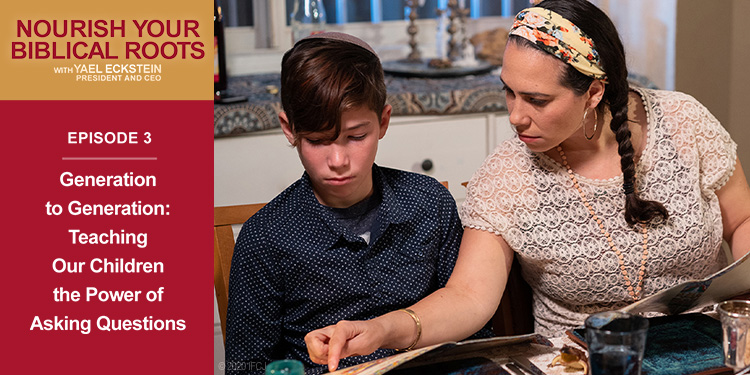Generation to Generation: Teaching Our Children the Power of Asking Questions

What’s the best way for children to learn? Teach them the power of asking questions. For millennia, the Jewish faith has held that the best way to serve God is by constantly learning and growing — and in order to learn, one must ask questions. Podcast host Yael Eckstein continues her summer series on passing on our faith to the next generation by exploring how the annual observance of Passover helps instill in her children the value of asking questions. Jewish families commemorate the most important event in Israel’s history — the Exodus from Egypt — by asking questions. Discover how this tradition encourages children to ask questions all year long — and how you can instill this valuable habit within your own family.
Episode Notes:
One of Yael Eckstein’s earliest childhood memories is at the family Seder, the ritual Passover meal. As the youngest of three daughters, it was Yael’s turn to ask the traditional “Four Questions,” that begin the Seder meal. “I can remember standing on a chair in my nice new dress while the entire family looked at me in proud expectation. After I recited the four questions in Hebrew, everyone cheered, and the Seder began,” Yael recalled.
What Yael didn’t understand in that moment was that what she had just done had been performed by the youngest child for thousands upon thousands of years. She was simply the next in a long line of ancestors to ask these questions on Passover eve. And while she did not understand the importance or significance of asking questions, it was very clear to her — and to every child who has ever recited these four questions — that asking was a good thing.
In fact, children are the most important guests at the table, and the Seder revolves mainly around them. “The Four Questions,” one of the most iconic and memorable Passover passages, is traditionally sung at the Seder by the youngest child able to do so. Incidentally, if no children are present then one of the adults must recite the questions. Moreover, if a person is alone, he or she must ask themselves “The Four Questions.” Such is the value that Judaism places on asking before receiving answers.
While the Seder is a powerful educational tool that is revisited every Passover, the overall objective is to encourage children to ask questions all year long. “To be a Jewish child is to learn how to question,” wrote Rabbi Jonathan Sacks, who served as Chief Rabbi of Britain from 1991 to 2013.
Judaism maintains that true faith can only come through asking questions, seeking answers, and choosing God as an act of freedom rather than an imposed state of being. The goal is to ensure that children will be seekers of God and the wisdom of the Bible for the rest of their lives.
As Yael explained, “Passover encourages children to ask questions and at the same time it reminds parents that question asking is a sacred experience — one that we must take seriously and respond to accordingly. And by putting our children at the very center of the Passover celebration, we are reminded once again that our children are our future. The beginnings of a better tomorrow lie in the questions that our children ask today.”
